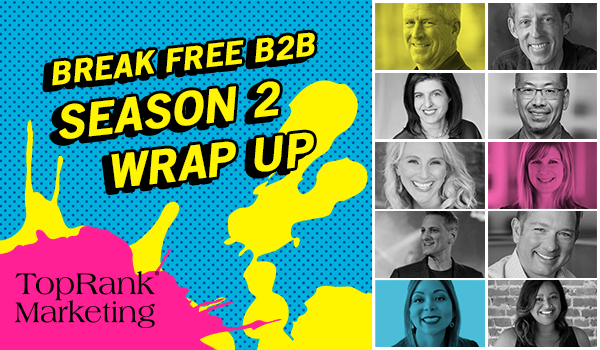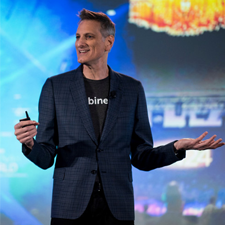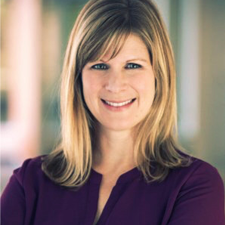
Season two of TopRank Marketing’s video podcast series, “Break Free B2B,” has come to a close. We had the opportunity to interview some of the smartest B2B marketers in the industry, to find out how they’re breaking the mold and reinventing the role and function of the marketing department in B2B organizations.
The series covered three key themes:
- Reinvigorating Scalable, Global ABM
- Creating Online and Offline Experiences that Inspire
- Reinventing B2B Marketing and How Success is Measured
One consistent message among all ten interviews is that it’s time to shake things up. B2B marketing doesn’t need more of the same. These experts are well aware of that fact. Simply repeating tactics that have ‘always been done’ and are considered industry standards is no longer enough. It’s time to push the envelope, find a way to scale your ABM program, inspire your prospects with experiences, and continue to evolve how you approach marketing and measurement.
One way to break free and improve upon traditional tactics is to work with — and learn from — folks who are influential in your industry. Incorporating influencers into your ongoing marketing strategy can enable you to break free from tradition and create something that reaches and inspires your audience.
As our CEO, Lee Odden, says “Focusing on accounts with the biggest revenue potential requires every competitive advantage. But ABM alone is not enough to break through to distracted and distrustful decision makers. To connect with accounts more effectively, B2B marketers are increasingly adopting influencer marketing to build trust, reach and engagement.”
To help you break free, we’ve pulled out some of the top highlights from this season, but you can see the full series on YouTube or on the season two page of the TopRank Marketing blog.
Reinvigorating Scalable, Global ABM
Employing a scalable, customer centric ABM program is a top priority for many of the B2B organizations we work with. B2B marketers need to reach the right audience, grow their key accounts, and continually prove the success of those efforts.
To find out how to achieve these goals, we looked to Gary Gerber of Folloze, Kelvin Gee of Oracle*, and Danny Nail of SAP* for advice.
Scaling ABM Without Losing Focus
Gary Gerber
Head of Product Marketing, Folloze
@Gary_Gerber | LinkedIn

“A hammer is one of the most useful tools in your toolkit, but you wouldn’t use it to repair a watch.” @Gary_Gerber of @Folloze on the need for more precision in #ABM. #BreakFreeB2B Click To Tweet
“You have to focus away from blunt instrument tools,” he says. “I’m not bashing blunt instruments, by the way, because a hammer is one of the most useful tools in your toolkit, but you wouldn’t use it to repair a watch. So you need to migrate to tools that let you [achieve] that kind of precision, because that’s the only way you’re going to build trust with your customers.”
Winning with Enterprise ABM
Kelvin Gee
Senior Director, Modern Marketing Business Transformation, Oracle
@kgee | LinkedIn

“Standardize, Evangelize, Train, Enable,” @kgee’s model for implementing #ABM at scale in large organizations like @oracle. #BreakFreeB2B. — Kelvin Gee Click To Tweet
“Companies do need to be more customer-centric, deliver a better customer experience, personalize the content, align with sales, and measure themselves differently,” he observes. “I call account-based a strategic glue that pulls all that stuff together.”
Watch Kelvin’s full interview.
Creating a Global ABM Platform
Danny Nail
Head of Global Account Based Marketing, SAP
@DannyNail | LinkedIn

“You have to let go of templatized old ideas…and start really digging into how you can change what you’re doing and make it more efficient, more effective, and be creative about that.” @DannyNail, @SAP Click To Tweet
“You have to let go of templatized, old ideas. You have to break free of thinking about things the way we’ve always thought about them, and start really digging into how you can change what you’re doing and make it more efficient, more effective, but be creative about that. Because the platform didn’t exist, but now it does. And that’s because we got creative about how we could scale ABM, as opposed to adding people to scale or adding money to scale.”
Creating Online and Offline Experiences that Inspire
There is an active perception in the market that B2B marketing content isn’t exactly inspiring. This may be true in some cases, but not all. B2B marketers know that breaking free from the boring, the expected, is how you set yourself apart from the competition and carve out your niche in the market. And that includes bringing online and offline experiences together, as well as using online content to create a personal bond between your brand and your customers.
We looked to marketing experience experts for their take on how to create inspiring experiences through content and interactive experiences. Sruthi Kumar of Sendoso, Mark Bornstein of ON24 and Sofia O’Malley of Dell Outlet* shared their experiences and advice.
Creating Memorable Experiences
Sruthi Kumar
Senior Marketing Manager, Sendoso
@sruthikkumar | LinkedIn

“It’s about bringing all the channels together to create that seamless experience for the end user, that person who you want to book a meeting with or have a signed contract with.” @sruthikkumar Click To Tweet
“What we’re trying to do is really bridge that online and offline experience. So not to say that digital marketing does not work. I’m a marketer. I run our field marketing team, we use digital heavily, but it’s just about bringing all the channels together to create that seamless experience for the end user, and that person that you want to book a meeting with or have a signed contract with or whatever else you need from them.”
Watch Sruthi’s full interview.
Dialing In Digital Experiences
Mark Bornstein
VP of Marketing and Chief Webinerd, ON24
@4markb | LinkedIn

“Companies that are trying to own thought leadership, they’re not going to do that through giving a webinar that’s a slide presentation. They’re doing it by building experiences.” — @4markb on #BreakFreeB2B #DigitalExperiences Click To Tweet
“So in the world of webinars, if you think about what a webinar was even a few years ago — and maybe in some cases still now — the webinar was a talking PowerPoint. Just a headless voice, you didn’t see anybody. You just heard somebody going through the slides in a droll way and it wasn’t branded and it was just boring. And maybe a lot of webinars still are kind of boring.
But the fact of the matter is, what we see companies doing now is they’re creating serialized programming. They’re creating these really cool almost TV-like viewing experiences, where it’s a show and there’s hosts and the formats are changing. There’s panel discussions and coffee talks and chat shows and new style formats. So companies that are trying to own thought leadership, to establish a voice, to be the company that people go to — they’re not going to do that through giving a webinar on, you know, here’s our content. Here’s our slide presentation. They’re doing it by building experiences. And I think a really great experience has a few of the following qualities: It should be completely branded. It should be interactive.”
Creating a Global B2B & B2C Marketing Team
Sofia O’Malley
Global Marketing Director, Dell Outlet
@sofiaomalley | LinkedIn

“You have to be cognizant of what is unique to each market. What’s the consumer behavior? What’s the consumer expectation or appetite for a type of execution?” @sofiaomalley of @DellOutlet on global #CX Click To Tweet
“I think the key is to have a consistent strategy. I think that needs to be scalable. And then where we start to see a little bit more difference is on the tactics.
So when you think about implementation of go to market, I think you really have to be cognizant of what is unique to each market. What’s the consumer behavior? Or what’s the consumer expectation within a given market or appetite for a type of execution.”
Reinventing B2B Marketing and How Success is Measured
The way we measure success in marketing – from our KPIs to ROI – has always been a bit of a moving target, especially for B2B. It’s no question that B2B marketers have a lot on their mind, and even more to prove. We’re accountable for driving pipeline and passing MQLs to the sales team, all while also building brand awareness and thought leadership.
But, what if we could reinvent how we measure marketing success and how we work with other departments and functions? And what if we did so in a way that works for sales, marketing and leadership? We talked to some experts in measurement and alignment to find out how to do it: Sean Crowley of Dun & Bradstreet, Lisa Sharapata and Latane Conant of 6sense and Julie Brown of Johnson Controls.
Cracking the Alignment Code
Sean Crowley
Leader, Integrated Marketing – Sales and Marketing Solutions, Dun & Bradstreet
@seantcrowley | LinkedIn

“It takes a coordinated approach, so we felt that the tiger team is a valuable way for us to manage that complexity, to create alignments, and to ensure that as we go to market, we’re doing it as a team.” @seantcrowley on #BreakFreeB2B Click To Tweet
“I lead a tiger team of marketers within the sales and marketing line of business because the integrated marketing role sits at that nexus of sales, product, content marketing, demand generation, social media and all of those things coming together. So when we’re releasing and launching campaigns, we want to make sure that we’re bringing in the perspectives and the expertise of each of those functional areas so that they’re well represented, that they’re well integrated, and then when we go to market, we can execute in an omni-channel environment.”
The End of the MQL
Lisa Sharapata
VP of Demand Generation and Content Strategy, 6sense
@lisasharapata | LinkedIn

“When we say, ‘we’re going to give you this amount of pipeline, we’re going to generate this amount of revenue,’ and we can actually see it coming and help deliver it in a predictable way, they are never going to want to go back to a #MQL…” Click To Tweet
“If you talk to most sales execs and you ask them “How valuable do you think the MQL’s really are?” and “How often do they turn into an SQL?” and “When marketing says they’re going to give you this many MQL’s, how meaningful is that truly to you?” Most of the time they’re like “Yeah, marketing is going to throw these scans from their event over the fence and tell us to work on them.”
And they don’t really put a lot of value in them. But when we say we’re going to give you this amount of pipeline, we’re going to generate this amount of revenue, and we can start to show that predictability, in saying this is what of your accounts are in market right now, that is worth this amount of pipeline to you and we can actually see it coming and help deliver it in a predictable way.. I’ll tell you what, they are never going to want to go back to a MQL again.”
Reinventing the CMO Role
Latané Conant
Chief Market Officer, 6sense
@LataneConant | LinkedIn

“If I am engaging accounts more effectively than my competition, I will generate more pipeline, I’ll win more often, I’ll have bigger deals, and I will set my relationship off with those customers better.” #B2BMarketing @LataneConant Click To Tweet
“I actually just changed my title to Chief Market Officer. And it’s an important distinction that a lady who was actually on our board — who’s amazing, her name is Christine Heckard, made. And she’s been a CMO. Now she’s the CEO. And she’s talked a lot about the role of the CMO. We have gotten ourselves really mired down in ‘ing.’ “I did a blog, I did webinars, look at all these MQLs I pass to sales, here’s my funnel, here’s my tech stack.” That is all ing ing ing.
Her challenge to CMOs is to redefine that. We are the seat at the table that needs to understand the market. That is customers today and customers tomorrow. That’s why this audience-first approach and understanding the market, then you can apply the ing.”
Watch Latané’s full interview.
Proving the EBT of Your Marketing
Julie Brown
Institutional Market Leader, Johnson Controls
LinkedIn

“It’s EBIT, operational ROI, revenue, & earnings per share. When marketing can say, if you give me this much within this period of time, I’ll deliver this much back.” — Julie Brown of @johnsoncontrols Click To Tweet
“[Marketing] figured out how to start talking about what they did in financial terms that the CFO understands. And on the flip side, every company is looking to grow. A lot of companies don’t look to marketing because they don’t trust and respect marketing enough to deliver that.
It’s financial terms, it’s EBIT, it’s operational ROI, it’s revenue, it’s earnings per share. Those are the things that they understand and when marketing can say, listen, if you give me this much within this period of time, I’ll deliver this much back.”
Break Free from ‘The Way It Has Always Been Done’ in B2B Marketing
If there is one common thread among these ten interviews, it’s that successful B2B marketing doesn’t follow ‘the way it has always been done’. Pushing boundaries, finding creative ways to set and measure goals, and focusing on creating inspiring experiences are just a few of the ways B2B marketers are breaking free.
If you’re craving more ways to break free, check out our Season 1 recap, or watch the on-demand webinar with Lee Odden, “Break Free from Boring B2B With B2B Influencers and Experiences that Inspire”.
*Oracle, SAP, and Dell Outlet are TopRank Marketing clients

Comments are Closed